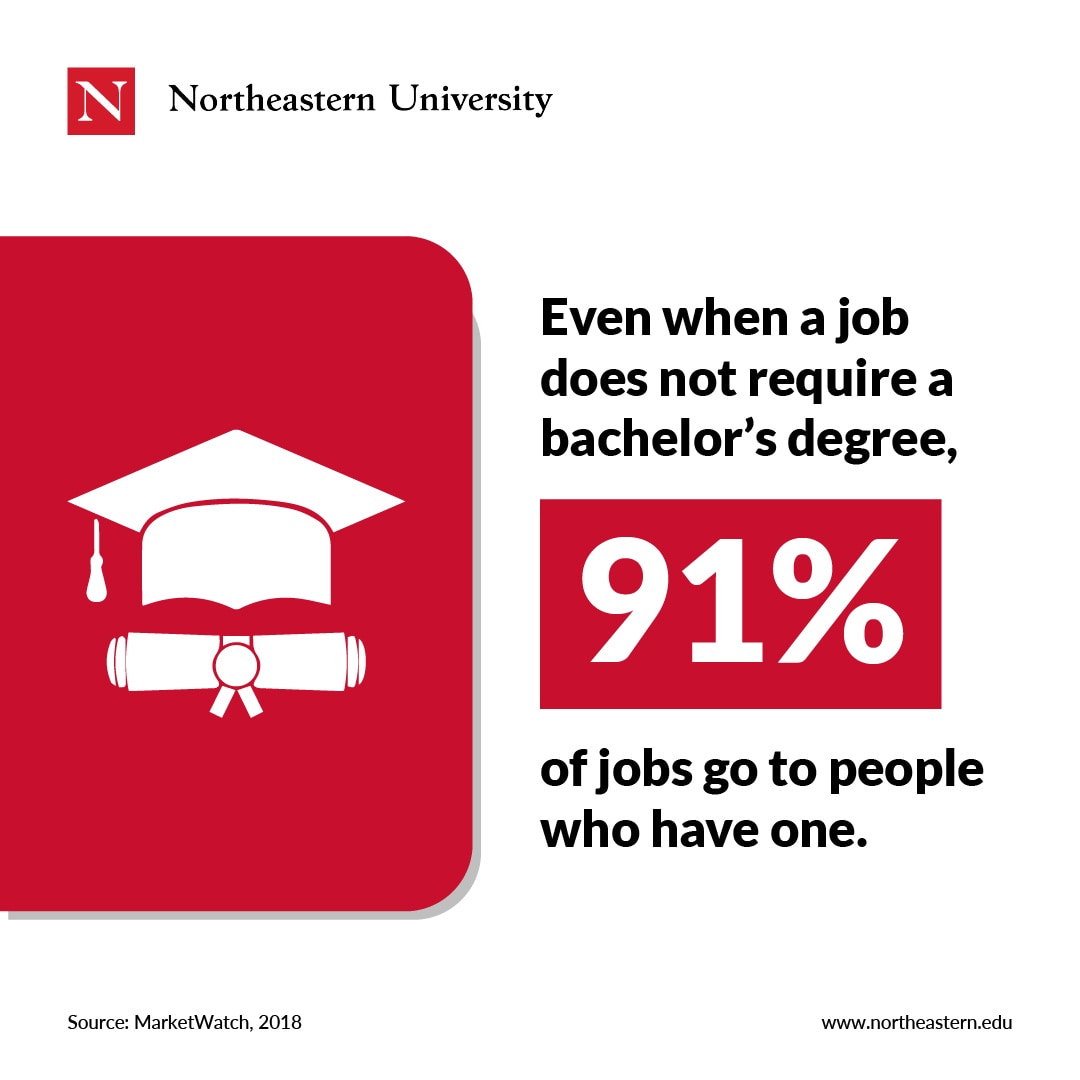How far can you really get without a college degree?
Bill Gates started Microsoft when he was 19 and has since become one of the world’s wealthiest people. Mark Zuckerberg owns one of the most highly-valued tech companies in the U.S.. Steve Jobs founded Apple in his garage.
What do these three people have in common? None of them finished college; in fact, Bill Gates is considered “Harvard’s most successful dropout.” What’s more, there are countless others who have gone on to start successful businesses without first earning a bachelor’s degree. So, considering modern opportunities and technological advances, is a degree still necessary? Or is it possible to succeed without a college education?
The short answer is “yes.” It is possible to succeed without college. But the longer answer is that succeeding without college—especially to the level that Gates, Zuckerberg, and Jobs did—is the exception, not the rule. To have a truly successful career, earning a college degree gives you a clear advantage.
Succeeding Without College
People define success in different ways. For some, it means having enough money to buy the things they want. For others, it means being respected by your peers. For some, it simply means having a loving and supportive family.
Others define success as attaining a career that allows them to pursue their passions. If you’re in that category, it’s important to know what jobs don’t typically require degrees. There are several growing positions that don’t require college education and offer reasonable salaries in the following industries:
- Construction and installation
- Maintenance and repair
- Transportation
Individuals in these positions can attain between $46,000 and $80,000, depending on their job title. Other positions that don’t require a degree include athletes, community health workers, and hearing aid specialists.
Why Is a Bachelor’s Degree Important?
Regardless of how you personally define success, the stats show that a bachelor’s degree can make having a successful career more achievable. Consider the following:
- On average, employees with at least a bachelor’s degree earn a median salary approximately 80 percent higher than high school graduates.
- People with a bachelor’s degree will add $1.2 million to their total lifetime earnings compared to high school graduates.
- High school graduates experience an unemployment rate two times higher than college grads.
So, while there are some newsworthy exceptions to the rule, the numbers don’t lie. With higher-paying jobs such as cybersecurity analyst, healthcare professional, and business administrator going to those with 4-year-degrees, bachelor’s degree holders are generally able to more easily find work and earn more than those with less education.
Could You Be the Next Steve Jobs or Bill Gates?
Hard work and determination certainly have their place in achieving success, and—if you have an entrepreneurial spirit, connections with angel investors, and a mind for tech trends—it’s possible to follow in the footsteps of Jobs or Gates. For the rest of us (those with interests outside of starting the next global tech phenomenon), the path to making it will be steadier and more traditional.
Also, not everyone has what it takes to risk it all—and if you look at those who made it big on a dream, they often face huge setbacks. Gates, for example, started a failing data company before Microsoft, causing him to start from scratch. Without a backup plan, an incredible support system, and unfailing work ethic, most of us can’t sustain these types of setbacks more than once in a lifetime.
The Importance of a College Degree to Success
In 2022, nine out of ten employers required a degree in order to apply for entry-level jobs. Even when a job does not require a bachelor’s degree, 91 percent of jobs go to people who have one. Considering that people with bachelor’s degrees are more likely to be employed and have a higher paying job, as a group they are more financially secure.

Of course, financial security is not everything—there’s more to a degree than earning potential. The people you meet in college will become part of an institutional support network that you can later call upon for work advancements, mentoring programs, and additional skill-building prospects. If you want to shift career paths or learn about new job opportunities in the future, leveraging your professional network is one of the best places to start.
For those who plan on starting a business, your future customers, vendors, and partners will often come from people you met through college. If your start-up ultimately fails, or you decide to switch gears later in life, you will have the skills and knowledge you gained while earning your degree to fall back on. You’re much more likely to succeed should your entrepreneurial endeavors miss the mark.
Not to mention, people with a bachelor’s degree are generally more satisfied in their careers and have improved self-esteem.
Being Well-Rounded Matters
If you don’t have grand career goals, it may seem that a degree is extra work for something you may never use. But many degree programs are designed to create a holistic educational experience. A bachelor’s program requires attention to detail, good study habits, communication skills, critical thinking, and the ability to form opinions.
All of these “soft skills” that you master in college are useful in your daily adult life, whether that’s running your own business or managing a family. While you may not have plans for a career that requires a college degree now, your plans may change. Getting your bachelor’s can prepare you for taking on new life challenges when the need arises.
So, Can You Make It Without A College Degree?
Why do so many people think that you have to go to college to be successful? It’s likely because they have experienced the benefits personally. Yes, it’s possible to succeed without a college degree. But with so many programs designed to take you from having no experience in a field to being highly-skilled and job-market ready, having a college degree offers a clear advantage.
Most of us aren’t Steve Jobs. And most of us don’t come with a vast network that we can fall back on when things get tough. A college environment provides the kind of support most adults need to not only get a degree, but start a life. Success, for many adults, starts the day they get that bachelor’s degree.
If you’re hoping to return to college and advance your career, Northeastern University offers several bachelor’s degree completion programs along with unique, personalized support to help you in your journey. Take a look to see if there’s one that meets your career goals, or get career advice from one of our admissions counselors today.
